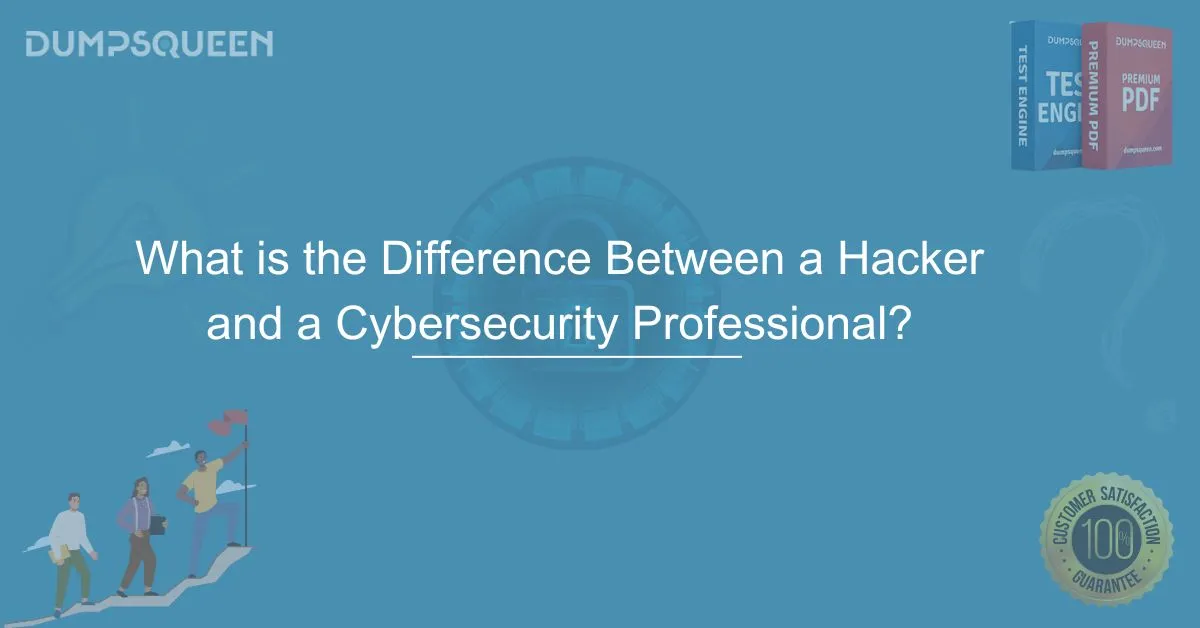Introduction
The world of cybersecurity is vast and complex, with different roles playing crucial parts in ensuring digital safety. Two of the most commonly discussed terms in this field are hackers and cybersecurity professionals. While they may seem similar due to their technical expertise and understanding of computer systems, their objectives and ethical responsibilities set them apart. In this article, DumpsQueen Official Website will explore the differences between hackers and cybersecurity professionals in detail, shedding light on their roles, skills, methodologies, and the impact they have on digital security.
Understanding Hackers
Hackers are individuals who use their knowledge of computer systems and programming to break into digital networks. Their intentions can vary widely, from ethical hacking to malicious cybercrimes. Hackers can be classified into different types based on their objectives:
White Hat Hackers
White hat hackers, also known as ethical hackers, work within the boundaries of the law. They use their expertise to identify security vulnerabilities in systems before cybercriminals can exploit them. Many white hat hackers work as penetration testers, security consultants, or researchers in the cybersecurity industry.
Black Hat Hackers
Black hat hackers are the cybercriminals who engage in illegal activities such as data breaches, identity theft, and financial fraud. They infiltrate systems for personal gain, political motives, or sheer destruction. These hackers exploit weaknesses in software and networks, often causing severe damage to businesses and individuals.
Grey Hat Hackers
Grey hat hackers operate in a morally ambiguous zone. They do not necessarily have malicious intent but may break into systems without permission to expose security flaws. While some grey hat hackers report vulnerabilities responsibly, others may demand a fee for their discoveries, creating ethical dilemmas.
Who is a Cybersecurity Professional?
A cybersecurity professional is an expert responsible for protecting digital systems, networks, and sensitive information from cyber threats. These individuals use proactive strategies to prevent, detect, and respond to cyberattacks, ensuring the security of businesses, governments, and individuals.
Key Roles of a Cybersecurity Professional
Security Analyst
A security analyst continuously monitors networks for suspicious activity, investigates potential threats, and implements protective measures to keep systems secure.
Penetration Tester
Also known as an ethical hacker, a penetration tester attempts to breach security defenses in a controlled environment to evaluate the effectiveness of existing security measures.
Incident Responder
Incident responders are responsible for identifying, containing, and mitigating security breaches when they occur. They analyze cyberattacks to prevent future incidents.
Security Engineer
A security engineer designs and implements secure systems, ensuring that software and hardware configurations adhere to cybersecurity best practices.
Differences Between a Hacker and a Cybersecurity Professional
While both hackers and cybersecurity professionals possess deep knowledge of digital security, their intent and actions distinguish them. Here are the primary differences:
1. Objective and Intent
· Hackers may seek to exploit systems for financial gain, activism, or other motives, whereas cybersecurity professionals aim to protect and secure systems.
· Ethical hackers fall under the category of cybersecurity professionals as they work to improve security rather than compromise it.
2. Legal Boundaries
· Black hat hackers engage in illegal activities, violating privacy and data protection laws.
· Cybersecurity professionals operate within the framework of laws and ethical standards, ensuring compliance with regulatory policies.
3. Methods and Techniques
· Hackers use malicious tools such as malware, phishing, and exploits to compromise systems.
· Cybersecurity professionals implement defensive strategies, using firewalls, encryption, and monitoring tools to counter cyber threats.
4. Impact on Cybersecurity
· Hackers can cause severe damage by stealing data, disrupting services, and creating security vulnerabilities.
· Cybersecurity professionals prevent and mitigate cyberattacks, ensuring the resilience and integrity of digital infrastructures.
How Cybersecurity Professionals Counteract Hackers
The fight against cybercrime is ongoing, and cybersecurity professionals play a crucial role in mitigating hacking attempts. Their strategies include:
· Implementing Strong Authentication Measures – Using multi-factor authentication (MFA) to prevent unauthorized access.
· Threat Intelligence Analysis – Monitoring cyber threats and analyzing hacker tactics to stay ahead of cybercriminals.
· Security Awareness Training – Educating employees and users about safe online practices to reduce human errors leading to cyber breaches.
· Regular Security Audits and Updates – Conducting vulnerability assessments to patch security loopholes.
Future of Cybersecurity and Ethical Hacking
With technological advancements, the role of cybersecurity professionals continues to evolve. Ethical hacking is becoming a recognized and essential practice in strengthening digital security. Governments and organizations are increasingly relying on cybersecurity experts to safeguard critical data from cyber threats.
Conclusion
The distinction between hackers and cybersecurity professionals lies in their intent, legality, and impact on digital security. While hackers exploit weaknesses, cybersecurity professionals work tirelessly to defend against cyber threats. Understanding this difference is crucial for businesses and individuals seeking to protect their digital assets. As cybersecurity continues to be a top priority, the demand for skilled professionals will only grow, making it an essential field for the future.
Free Sample Questions
1. What is the primary difference between a hacker and a cybersecurity professional?
A) Hackers protect networks, while cybersecurity professionals exploit them.
B) Hackers operate legally, while cybersecurity professionals engage in illegal activities.
C) Hackers exploit systems for personal or malicious gain, while cybersecurity professionals protect and secure systems.
D) There is no difference between the two.
Answer: C) Hackers exploit systems for personal or malicious gain, while cybersecurity professionals protect and secure systems.
2. Which type of hacker operates within legal boundaries to identify vulnerabilities?
A) Black hat hacker
B) White hat hacker
C) Grey hat hacker
D) Script kiddie
Answer: B) White hat hacker
3. What is the role of an ethical hacker in cybersecurity?
A) To create malware for security firms
B) To legally hack systems and report vulnerabilities
C) To steal sensitive data from organizations
D) To disrupt government websites
Answer: B) To legally hack systems and report vulnerabilities



